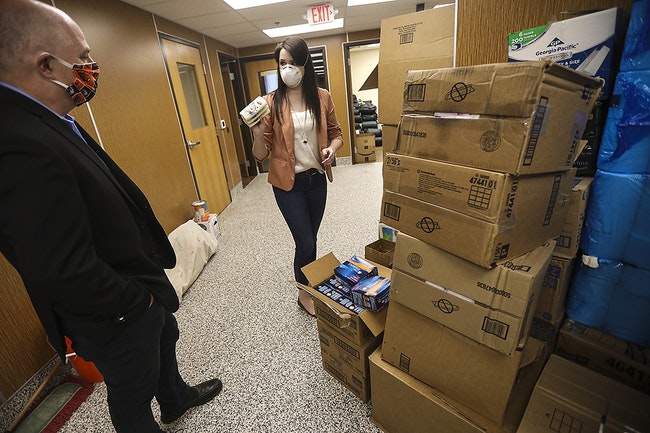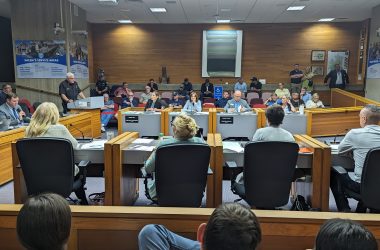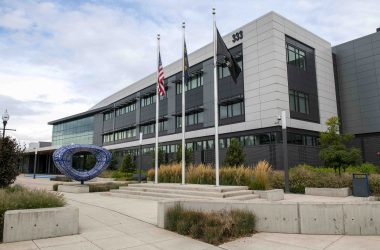 Ashley Hamilton, program director of the ARCHES Project, shows Jimmy Jones, executive director of the Mid-Willamette Valley Community Action Agency, recently donated supplies that are currently stored in the building’s unused sobering center on May 7, 2020. (Amanda Loman/Salem Reporter)
Ashley Hamilton, program director of the ARCHES Project, shows Jimmy Jones, executive director of the Mid-Willamette Valley Community Action Agency, recently donated supplies that are currently stored in the building’s unused sobering center on May 7, 2020. (Amanda Loman/Salem Reporter)
A downtown Salem facility built last year to be used as a sobering center for severely intoxicated people now sits unoccupied aside from extra storage as a lack of funding has stalled the project for almost three years.
The sobering center space, intended to take in drunk or intoxicated people that police would otherwise jail or take to the hospital, was completed in March 2020 in the ARCHES Project building at 615 Commercial St. N.E.
The project otherwise hasn’t moved, and city officials’ plans to find nearly $1 million for operating the sobering center have so far fizzled out.
Responding on behalf of Mayor Chuck Bennett, city spokesperson Courtney Knox Busch said in an email that the city is “exploring what it may cost” to operate the sobering center.
“Our next steps are to re-examine some of the assumptions we were making about staff required for a safe place to become sober in our community, operating 24 hours a day, seven days a week,” Busch said.
She said the city could not address questions from Salem Reporter about the sobering center, including what is delaying it from operating, where its budget currently stands and who would make up its staff.
“Because we’re currently re-evaluating the scope, we don’t have answers to your detailed questions,” she said in an email. “We hope to be ready with a plan for moving this much-needed service forward by January (2022).”
As many Salem residents continue to call for a program where mental health workers respond to some crisis calls instead of police, county officials have said money would be better spent on places like navigation and sobering centers to take people in crisis. Meanwhile, Tim Black, operations coordinator for Eugene-based CAHOOTS, told the Salem City Council in November that its teams resolve at the scene more than two-thirds of the mental health calls they are dispatched to.
The Mid-Willamette Valley Community Action Agency acquired the property in summer 2017 when it was planning to build a day center for homeless people. Jimmy Jones, executive director for the agency, said they wanted to involve the city, as the project required extra resources to build the space as intended.
“We just kind of had a synergy of interest,” Jones said. “They wanted to help us get the day center completed. They also wanted to create a sobering space, and the sobering space was part of our deal, so to speak.”
Ashley Hamilton, program director for the ARCHES Project, said Good Earth Construction was the general contractor for the sobering center and AC + Co was the architect.
Jones said he thought three years ago that there was a general agreement among those interested in opening the sobering center to get it financed.
The agency completed the space, expecting that available funding would eventually meet the budget. “But the financing agreement for the operation side never fully came together,” he said.
City officials said in a January 2019 staff report that the combined $450,000 the city, Marion County and Salem Health had pledged to fund the center fell nearly half a million short of budget projections. The center was then estimated to cost around $950,000 to run in its first year — up nearly $300,000 from its last budget estimate. The forecast came from Bridgeway Recovery Services, which was then expected to run the center.
Salem pledging $250,000 to pay staff and run the center prompted Bennett to call on Marion County and Salem Health – each offering $100,000 — to chip in more.
“Nobody’s talked about this in two years,” Jones said. “So I don’t know if Bridgeway even wants to be part of it anymore. I don’t know if the hospital wants to be part of it.”
The city’s Urban Renewal Agency also agreed to grant $1.1 million to the Mid-Willamette Valley Community Action Agency to help build a space that would be used for the center and an expanded day center for homeless people.
Earlier this year during the 2021 Legislative Session, the city unsuccessfully asked the state legislature for $1 million to cover the two-year operating costs for a sobering center.
“We were fortunate to receive funding from the Legislature for several other city priorities in the last session, including a low-barrier navigation center, body-worn cameras for our public safety officers, our Salem Housing Authority housing assistance voucher program, and temporary shelters,” Busch said.
Now, the Mid-Willamette Valley Community Action Agency is storing food, blankets and other items for homeless people in the sobering center space, as well as for other outreach. During the June and August heat waves, Hamilton said the agency used the space as the “central hub” to store supplies for staff to pick up and give out in the community.
But she said the space is “basically ready to go” and can be easily converted to start operating as a sobering center.
“It’s a ‘Field of Dreams’ moment where we built it out hoping it would be utilized, and so we’re happy to use it in the meantime,” Hamilton said. “But if the city and other partners come together for the actual operations of the sobering center, I think that’s really quickly and really easily implemented on our end.”
Specific policies and procedures haven’t yet been developed, Jones said, but patients while checking in would likely undergo an assessment to ensure they were “an appropriate client” for the sobering center. They would get water and a bed to sleep it off. “When they had some level of sobriety, they would be released back outside,” he said.
He said nurses would be needed to monitor patients getting treatment like IVs. Treatment at the sobering center could be as short-term as a day or even eight hours.
“There is a sort of broader philosophical question about whether or not it’s the best project anymore,” he said.
He pointed to Central City Concern’s sobering station in Portland, which he said shut down last year due to an influx in people coming into the facility who were high on methamphetamine and often experiencing mental health crises that required more serious medical treatment.
“They don’t come in and sleep that off like an alcoholic will sleep off being heavily intoxicated,” he said. “This issue of alcohol versus meth has changed the conversation lot, so I don’t know where it is. As far as we’re concerned, we have a commitment to provide a sobering space if and when they decide they want to run one, so we’re in on this. But I do think everybody needs to step back and take a long, hard look at the design of it and what it’s intended to do and whether or not it will be successful.”
PRIOR COVERAGE:
Mayor calls on Marion County, Salem Health to help pay for proposed sobering center
Besides budget concerns, construction delays added to sobering center woes
Salem considering buying ARCHES building, bankrolling more services for homeless
Salem buys time to find funding for sobering center as construction starts
City of Salem is again asking the Legislature to help fund housing and homeless projects
Contact reporter Ardeshir Tabrizian: [email protected] or 503-929-3053.
JUST THE FACTS, FOR SALEM – We report on your community with care and depth, fairness and accuracy. Get local news that matters to you. Subscribe to Salem Reporter starting at $5 a month. Click I want to subscribe!

Ardeshir Tabrizian has covered criminal justice and housing for Salem Reporter since September 2021. As an Oregon native, his award-winning watchdog journalism has traversed the state. He has done reporting for The Oregonian, Eugene Weekly and Malheur Enterprise.









